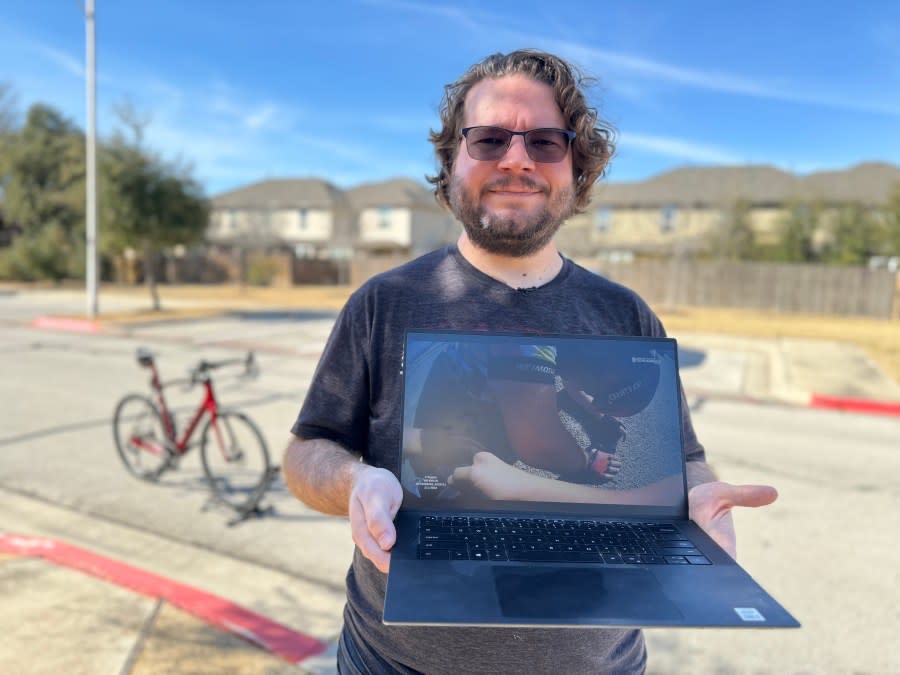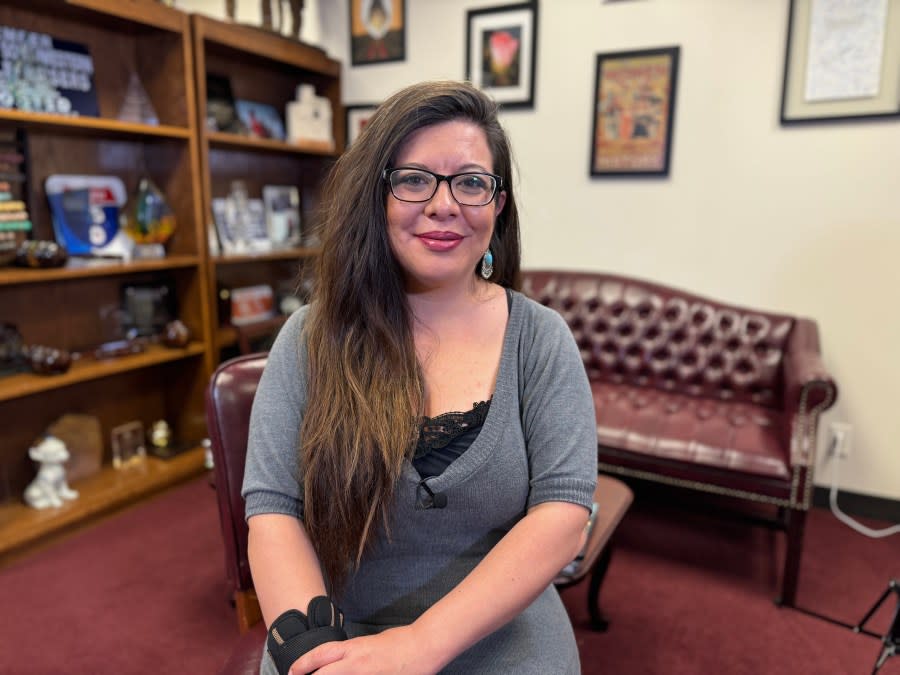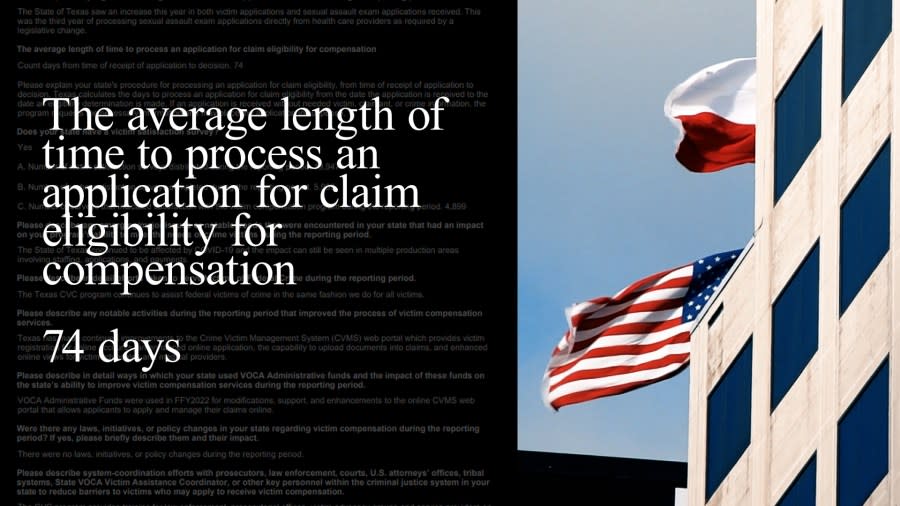Crime victim claims delayed, Attorney General data skewed, lawmaker stepping in

AUSTIN (KXAN) – The wreck happened in a flash.
Steven Heller was enjoying a New Year’s Day bike ride through Pflugerville on the first day of 2023. The next moment, in a blur, Heller recalls an impact launching him through the air and watching his bicycle flying in the other direction beneath him.
“I don’t think many people would walk away from being hit with a car that fast,” Heller said at his kitchen counter, after viewing police footage of the incident obtained by KXAN for the first time. The stolen car that hit him at the intersection of Gattis School Road and Farm to Market Road 685 in Pflugerville was in a police chase and driven by a convicted felon, according to court records.
“It’s just the amazement that I walked away from this,” he said.
Before seeing the footage, Heller had no idea how fast the stolen car was moving or that a second sedan was inches from running over his head. After the car hit Heller, it careened through a traffic signal pole, leaving nothing but a shattered metal stump.

At the hospital, Heller’s diagnostic scans and a medical evaluation miraculously found only minor injuries. Since the incident was classified as a violent crime, Heller qualified for assistance with medical bills from the state’s Crime Victims’ Compensation Program, or CVC.
The CVC program’s goal is to help victims move forward with their lives. The Office of Attorney General Ken Paxton operates the fund. It reimburses people for hospital bills, therapy, relocation, lost wages and more. The money used is primarily generated from court fees, rather than taxes.
KXAN has followed Heller’s and other victims’ cases for more than a year. Through multiple reports, dozens of public information requests, and interviews with former and current employees, KXAN has revealed a struggling department – with high turnover and staffing shortages – that has left victims waiting in a bureaucratic maze of paperwork for months.
Explore: Held Up – Crime victims left waiting for state money
Amid these investigations, KXAN also discovered the program has submitted statistics to the state Legislature that make it appear victim claims are being handled far faster than reality.
For example, in the summer of 2023, the average victim waited six months for a first payment, according to internal division data obtained by KXAN. Meanwhile, the CVC office reported to lawmakers that claims were being paid in an average of just 36 days, according to state records.
The questionable statistics uncovered by KXAN caught the eye of Rep. Mary Gonzalez, D-Clint, who said she was “perturbed” by them.
“We expect for that data to be integral,” said Gonzalez, vice chair of the House Appropriations Committee. If data submitted to the Legislature are “skewed,” it can impact their evaluation of an agency’s performance, she said.
“This data is critical,” she said. “This is exactly the type of information we use to decide how much money gets appropriated; how much staff is needed.”
Misleading calculations?

To arrive at the statistics sent to the Legislature, KXAN discovered Paxton’s CVC office averages two very different types of claims together: victim claims that take months to pay and sexual assault examination claims that typically take less than a week. What’s more, sexual assault exam payments don’t involve victims at all – they’re handled directly between medical providers and the state, according to interviews with former and current workers and agency records.
“It has been very concerning to me, as I continue to dig into this,” Gonzalez said. “I am very fortunate that the appropriations staff of the Texas House is looking into this, and we are working hard with other members of the Legislature to bring more light to the information and to make sure that we hold the agency accountable.”
Former AG official: skewed math obscures Texas victim compensation delays
In light of KXAN’s findings, Gonzalez said she’s working to build a coalition of lawmakers who will dig into the questionable CVC data and try to find a solution before the next Legislative session begins in 2025.
Paxton’s communications office has not provided a comment or acknowledged receipt of KXAN’s approximately two dozen emails with detailed questions and phone messages since November. For this most recent report, KXAN called and emailed a half dozen times over the course of two weeks. Paxton’s press office never responded.
The last time Paxton’s office provided a comment on the CVC topic, in September 2023, a spokesperson said the office was “nearly fully staffed after the OAG worked alongside the legislature to address recruiting and retention difficulties that state agencies have faced in recent years, resulting in an across-the-board pay raise for all state employees.”
In January, a CVC employee list showed 22 vacant positions, about half the number of vacancies in April 2023, according to department rosters.
Despite the staffing improvements, claims are still taking months to process.
AG’s office tells feds one thing, Texas lawmakers another
KXAN dug into the CVC office’s most recent fiscal year 2022 report to the U.S. Department of Justice’s Office for Victims of Crime and discovered Paxton’s office submits strikingly different metrics to state Legislators compared to federal authorities.
States that receive CVC funding from the federal government submit their performance statistics to the federal Office for Victims of Crime.
‘Retraumatizing:’ State staffing woes punish Texas crime victims
In fiscal year 2022, Texas reported to the federal government the average claim took 74 days to determine eligibility. Meanwhile, Paxton’s CVC office reported to the state Legislature it took 39 days, on average, to analyze a claim, determine eligibility and make a first payment.
The Attorney General’s office reported to state lawmakers the time it took to determine eligibility and pay out claims to victims was 39 days (KXAN Graphic/Richie Bowes) The AG’s office reported to the US Department of Justice that 74 days was the time to determine if someone is eligible. (KXAN Graphic/Richie Bowes)
It isn’t clear why the CVC divisions submit such different measurements to the state and federal governments.
Regarding how Texas compiles the federal statistics, a DOJ official referred to an instruction manual that says Texas should “count the days from the time of receipt of an application to decision. Note: Processing time is based on a state’s established procedure.”
The instructions do not mention whether sexual assault examination claims may be included, and Paxton’s office did not respond to specific questions about its federal reporting methods.
KXAN asked the DOJ if it had concerns about the different statistics being reported to the federal and state governments. A DOJ official said it is “unclear” if the reports rely on the same metrics, and the DOJ doesn’t have oversight of state legislature reports.
Gonzalez called the disparate state and federal reports, which a KXAN investigation uncovered, “very concerning.”
“I think the AG’s office is probably telling us different data because we are responsible for how much funding the agency gets,” Gonzalez said. “They want to demonstrate they are high-performing, even if those numbers aren’t completely accurate.”
‘Skewed’ data
Part of the reason the state data has become “skewed,” as Gonzalez described it, is because legislative changes streamlined the reimbursement process for sex assault examination claims.
In 2019, Rep. Victoria Neave Criado, D-Dallas, authored House Bill 616, which allows medical providers to be reimbursed directly by the CVC program for sex assault examinations. That change sped up sexual assault claims.
To get a better idea of how other states handle their statistics, KXAN contacted crime victim compensation offices in the 10 most populous states outside Texas. We asked if they include sexual assault examination claims in measurements reported to the state or federal government.
Of those that responded and answered KXAN’s specific questions, California, Ohio, Georgia and Michigan said they do not include sexual assault examinations in their calculations. Illinois and New Jersey’s crime victim compensation offices said they don’t handle costs for forensic exams. Florida did not answer that specific question from KXAN. New York and Pennsylvania never responded.
At least one state, North Carolina, said it does include sexual assault forensic examination claims in its performance report to the federal government.
Gonzalez wants Texas to separate out rape kit exam data to give lawmakers a more accurate picture of how long victims, overall, are waiting for help.
“I think taxpayers and Texans just want transparency,” she said.
Another state lawmaker, Sen. Judith Zaffirini, D-Laredo, who is on the Texas Senate Finance Committee, said she is dedicated to “collaborating” with Paxton, advocates and stakeholders to “ensure the effective and prompt service” of the CVC funds. Zaffirini said she will be looking at “allocating resources and enhancing data collection” to improve the program.
Lawmakers eye fixes to Texas crime victim fund after KXAN investigation
Heller expressed some surprise and concern about how Texas’ CVC office has reported its performance, but the statistics were more of an afterthought. At the forefront of Heller’s mind has been a months-long struggle to get his medical bills paid.
At the time of KXAN’s November report, Heller had waited nearly six months and received nothing except unanswered phone calls. A week after KXAN’s investigation aired, he was told his hospital bill totaling $1,327.76 was paid. At the end of January — more than a year after his accident — the CVC office paid $650 for his ambulance bill, effectively closing the saga of his wreck and bills. Heller shared his payment records and bills with KXAN.
“I feel great about it,” Heller said. “I’ve been sick of dealing with this for over a year, trying to get the payment that they said I should get.”
The process was difficult, but Heller knows it can be even tougher for more complex cases. He considers himself lucky.
“I can’t imagine what it’s like for someone with a more traumatic experience, with bills that are even more expensive, having to deal with this,” he said. “And having to relive that trauma, again and again.”
Investigative Photojournalist Richie Bowes, Director of Investigations & Innovation Josh Hinkle, Digital Special Projects Developer Robert Sims, Graphic Artist Christina Staggs and Digital Director Kate Winkle contributed to this report.
For the latest news, weather, sports, and streaming video, head to KXAN Austin.



